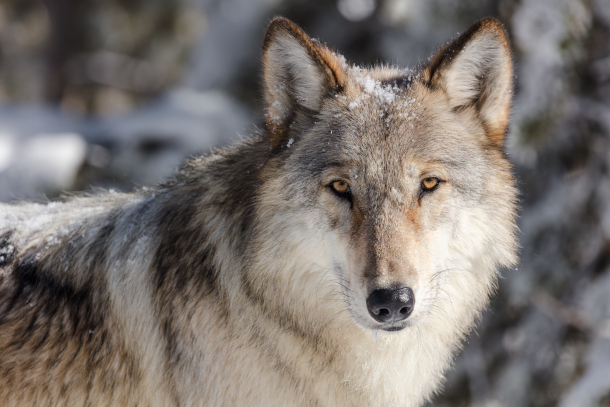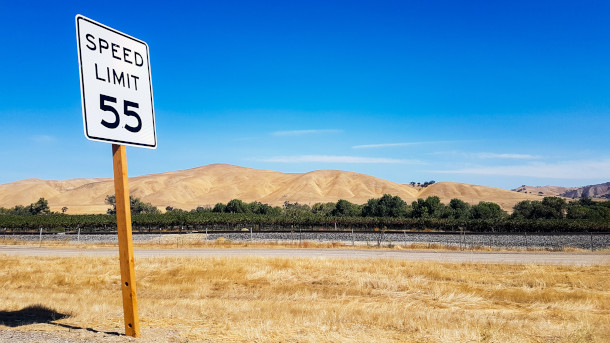Beyond the Headlines
Air Date: Week of December 9, 2022

China has 7% of the world’s arable land but accounts for one-third of global chemical fertilizer use. (Photo: Courtesy of Natalia Chernenko, Unsplash)
In this week’s trip beyond the headlines, Environmental Health News editor Peter Dykstra and Host Steve Curwood discuss the results of the Georgia runoff election and its implications for environmental policy. Next, they touch on fertilizer and pesticide reductions in China and controversial state-sanctioned wolf hunting in Montana. Finally, they go back in time to remember the 55-mph federal speed limit.
Transcript
BASCOMB: It’s Living on Earth, I’m Bobby Bascomb
CURWOOD: And I’m Steve Curwood.
And on the line now from Atlanta, Georgia is Peter Dykstra. He's an editor with Environmental Health News–that's ehn.org–and dailyclimate.org. Hey, Peter, I know that you have a lot of athletics in your town, but more recently you had multiple races for the United States Senate. I guess Mr. Warnock is going to be going back there after all.
DYKSTRA: Well, hi, Steve. Yeah. And it's–we're talking about a victory by incumbent senator Reverend Raphael Warnock over Herschel Walker. Just a quick comparison: Warnock had a 100% score in the last full year, 2021, from the League of Conservation Voters. Herschel Walker has run before but the last times he ran were in the National Football League at the University of Georgia where he won the Heisman trophy, and in the short-lived US Football League, where he ran for a team owned by real estate mogul Donald Trump.
CURWOOD: Yeah, so I guess they had met before. What do you think this means now for environmental and climate issues in the Senate?
DYKSTRA: Well, having a true majority in the Senate for the Democrats, plus their two independents, means that they can pick their own committee assignments and overcome any delays or hassles, at least in the Senate, not just by Republicans, but also by sometimes reticent Democrats, like Senator Joe Manchin of West Virginia, who is proven to be a reliable friend of the coal and petroleum industries.
CURWOOD: Okay. Hey, Peter, what else do you have for us today?
DYKSTRA: A little possible good news from China. Their foreign ministry has announced a goal of a 10% cut in pesticide use on food crops by the year 2025.
CURWOOD: How much pesticides do they use anyway?
DYKSTRA: Well, here's one indication, not of pesticides, but a farm impact overall: Foreign Ministry of China says they have 7% of the world's arable land, and they use roughly 1/3 of the world's chemical fertilizers on that 7% of the land.
CURWOOD: Well, and of course, pesticides are linked to degrading the soil, polluting the water. And human exposure is often, let's put it mildly, not very healthy.
DYKSTRA: Not at all, and it's a step forward, but it's a step forward from a nation whose pesticide use has been notoriously backward.
CURWOOD: Okay, tell me, what else do you have in the way of news?

Gray wolf population management is highly contested in Montana. (Photo: Courtesy of Yellowstone National Park, Flickr, Public Domain)
DYKSTRA: One thing that caught my eye was from the state of Montana, where a judge has refused to grant an injunction to two environmental groups that want to halt the very controversial, very aggressive hunting of wolves within the state that was put into motion by Montana's new Governor Greg Gianforte, who, interestingly enough, was replaced from his time as a congressman by a previous congressman, former Interior Secretary, Ryan Zinke.
CURWOOD: Let's take a look now in the annals of history and tell me what you see.
DYKSTRA: December 8th, 1995, was the day that many states acted on a bill passed by Congress signed in November '95 by President Bill Clinton to roll back the 55 mile an hour speed limit. That speed limit had been in effect for 21 years, ever since the energy crisis during the Nixon administration. Its proponents say that the 55 mile an hour speed limit saved lives and saved millions of barrels of oil. Proponents of getting rid of the ban say that it imposed on drivers' personal freedom and also cost a lot of money by slowing down the nation's trucking fleet and their delivery of goods.
CURWOOD: Even in 1995 if you did 55 miles an hour on many interstates, you'd get rear-ended.
DYKSTRA: Very, very few people out there–I would plead guilty to this myself–pay strict attention to whatever the speed limit is. Many of us tend to cheat a little bit but the 55 mile an hour speed limit drove many drivers crazy.

December 8th, 1995, was the day many states stopped enforcing the 55 mph federal speed limit when it was repealed by the National Highway System Designation Act of 1995. (Photo: Courtesy of Ludovic Charlet, Unsplash)
CURWOOD: Hey, thanks, Peter. Peter Dykstra is an editor with Environmental Health News. That's ehn.org and dailyclimate.org. We'll talk to you again real soon.
DYKSTRA: All right, Steve, great. We'll talk to you soon.
CURWOOD: And there's more on these stories on the Living on Earth webpage. That's loe.org.
Links
Reuters | “China Eyes 10% Cut in Pesticide Use on Fruit, Vegetables By 2025”
Click here to see Raphael Warnock’s stellar track record on environmental issues:
The Intercept | “Montana Judge Won’t Halt Gov. Greg Gianforte’s Aggressive Wolf Hunt”
Read more about the history of the federal 55 mph speed limit here:
Living on Earth wants to hear from you!
Living on Earth
62 Calef Highway, Suite 212
Lee, NH 03861
Telephone: 617-287-4121
E-mail: comments@loe.org
Newsletter [Click here]
Donate to Living on Earth!
Living on Earth is an independent media program and relies entirely on contributions from listeners and institutions supporting public service. Please donate now to preserve an independent environmental voice.
NewsletterLiving on Earth offers a weekly delivery of the show's rundown to your mailbox. Sign up for our newsletter today!
 Sailors For The Sea: Be the change you want to sea.
Sailors For The Sea: Be the change you want to sea.
 The Grantham Foundation for the Protection of the Environment: Committed to protecting and improving the health of the global environment.
The Grantham Foundation for the Protection of the Environment: Committed to protecting and improving the health of the global environment.
 Contribute to Living on Earth and receive, as our gift to you, an archival print of one of Mark Seth Lender's extraordinary wildlife photographs. Follow the link to see Mark's current collection of photographs.
Contribute to Living on Earth and receive, as our gift to you, an archival print of one of Mark Seth Lender's extraordinary wildlife photographs. Follow the link to see Mark's current collection of photographs.
 Buy a signed copy of Mark Seth Lender's book Smeagull the Seagull & support Living on Earth
Buy a signed copy of Mark Seth Lender's book Smeagull the Seagull & support Living on Earth

